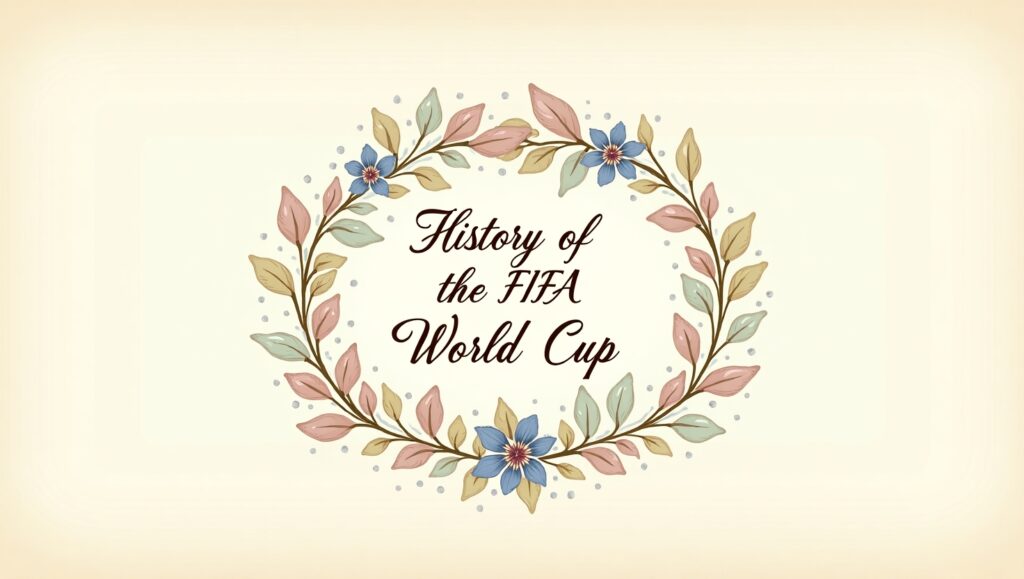The FIFA World Cup is more than just a football tournament—it’s a celebration of worldwide solidarity, culture, and sportsmanship. Held every four years, the World Cup brings together nations in a competitive but friendly tournament that captivates billions of spectators worldwide. From its modest start in 1930 to becoming the biggest sports event on Earth, the history of the FIFA World Cup is packed with
The notion of an international football competition was born in the early 20th century. Football was already a popular sport, and following successful football competitions at the Olympics, FIFA (Fédération Internationale de Football Association) decided to organize its own tournament. The first FIFA World Cup took held in Uruguay in 1930.
The Birth of the World Cup (1930)
OThe Birth of the World Cup (1930) only 13 teams partici pated—seoven from South America, four from Europe, and two from North America. Uruguay, commemorating its centenary of independence, won the inaugural tournament by defeating Argentina 4-2 in the final. The success of the event provided the framework for what would become a global phenomenon.
Growth and Globalization (1934–1950)
The second World Cup in Italy in 1934 witnessed increased European participation and a knockout system. Italy triumphed as champions, using home advantage to lift the trophy. Four years later, in 1938, the tournament was hosted in France and again won by Italy, making them the first team to win back-to-back titles.
Due to World War II, the tournaments in 1942 and 1946 were canceled. The World Cup returned in 1950 in Brazil, marked by one of the most shocking upsets in history—Uruguay defeated Brazil 2-1 in the final match at the Maracanã Stadium, a result that astonished the host nation.
The Era of Legends (1954–1978)
The 1954 World Cup in Switzerland launched live television broadcast, expanding its audience. West Germany won their first title by overcoming the highly favored Hungarian squad in the final. This triumph became known as the “Miracle of Bern.”
In 1958, the world was introduced to a 17-year-old Brazilian named Pelé, who guided Brazil to their first title in Sweden. Brazil would go on to dominate the next two decades, winning again in 1962 (Chile) and 1970 (Mexico) with Pelé becoming a global legend.
The 1966 World Cup was hosted by England, who won their sole title by defeating West Germany at Wembley Stadium. The tournament is remembered for Geoff Hurst’s hat trick in the final—the only one ever scored in a World Cup final.
Modernization and Expansion (1982–1998)
The 1982 tournament in Spain extended to 24 teams, reflecting the expanding global interest in football. Italy, led by Paolo Rossi, captured their third World Cup title. In 1986, hosted in Mexico, Diego Maradona wowed the world with his “Hand of God” goal and the “Goal of the Century” against England, guiding Argentina to victory.
In 1990, West Germany won their third title, right before the country’s reunification. Four years later, Brazil captured their fourth trophy in 1994 in the USA, marking the tournament’s successful introduction into a non-traditional football market.
The 1998 World Cup in France saw the number of participating teams expand to 32. Host nation France won their first title, with Zinedine Zidane scoring twice in the final against Brazil.
The 21st Century Boom (2002–2018)
The 2002 World Cup, co-hosted by South Korea and Japan, was the first in Asia and heralded a new chapter in football history. Brazil, headed by Ronaldo, won their fifth title. The 2006 tournament in Germany was famous for Italy’s penalty shootout win against France and Zidane’s notorious headbutt in the final.
In 2010, South Africa became the first African nation to host the World Cup. Spain won their first title, exhibiting a wonderful style of play known as “tiki-taka.” The 2014 World Cup in Brazil was a spectacle, but also remembered for Brazil’s startling 7-1 semi-final loss to Germany, who went on to win their fourth title.
The 2018 World Cup in Russia saw France secure their second title, spearheaded by a young and energetic team with stars like Kylian Mbappé.
Looking Ahead: Qatar 2022 and Beyond
The 2022 World Cup in Qatar was the first held in the Middle East and the first to be played in November and December due to excessive summer heat. Argentina, driven by Lionel Messi, raised their third title following a dramatic final against France—regarded by many as the best World Cup final ever.
Looking forward, the 2026 World Cup will be jointly hosted by the USA, Canada, and Mexico, with an expanded format of 48 teams. This reform underscores FIFA’s objective of making football more inclusive and worldwide.
Conclusion
The history of the FIFA World Cup is a mirror of global history, showcasing how sports can unite, inspire, and entertain. From its humble origins in Uruguay to its billion-strong audiences today, the tournament continues to evolve with every iteration. As the world gets up for future World Cups, one thing stays constant—football’s potential to bring the world together.
Key SEO Keywords: History of FIFA World Cup, FIFA World Cup timeline, Woi

